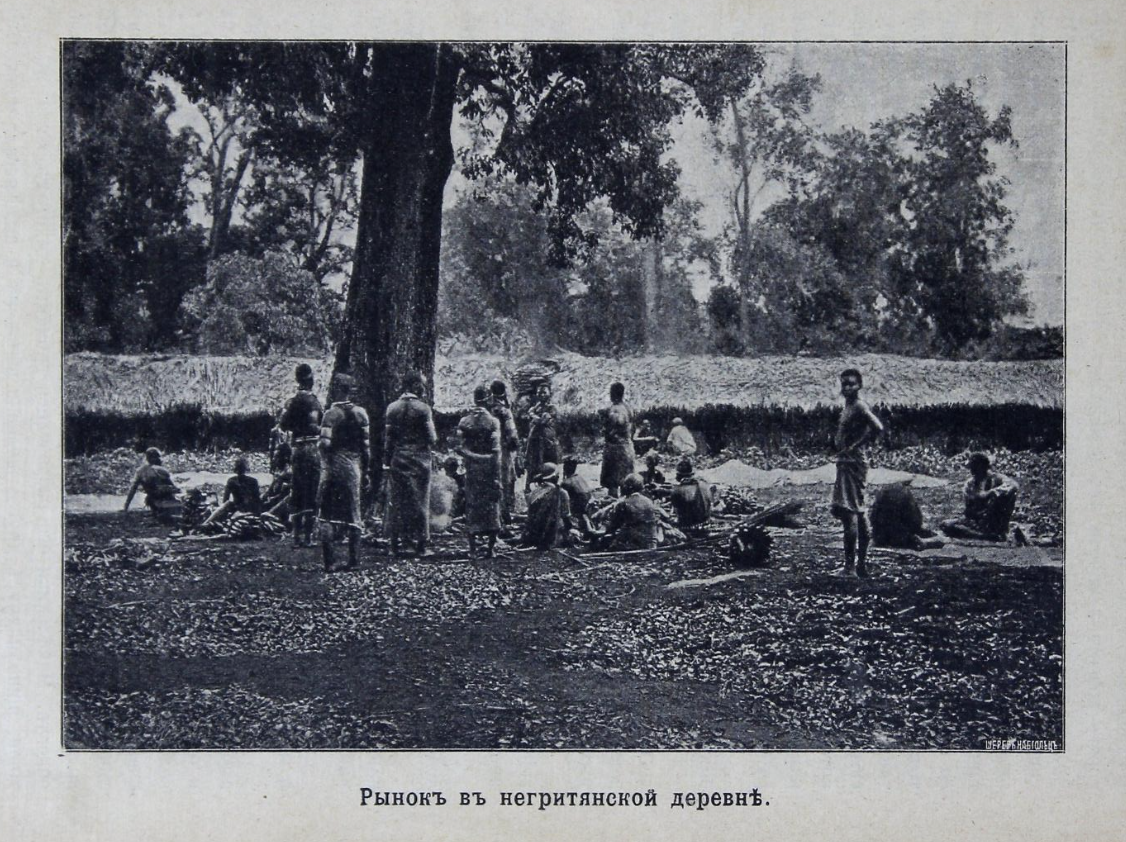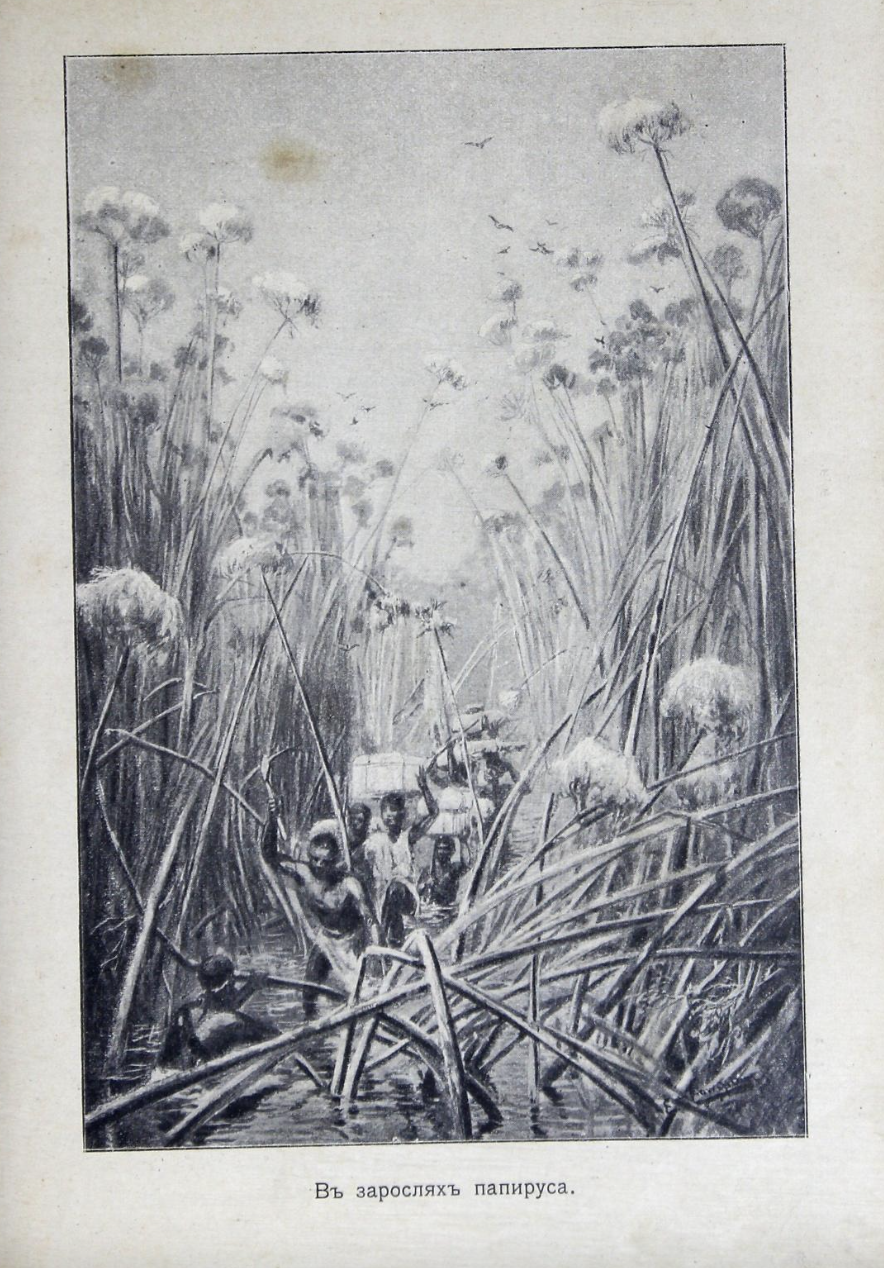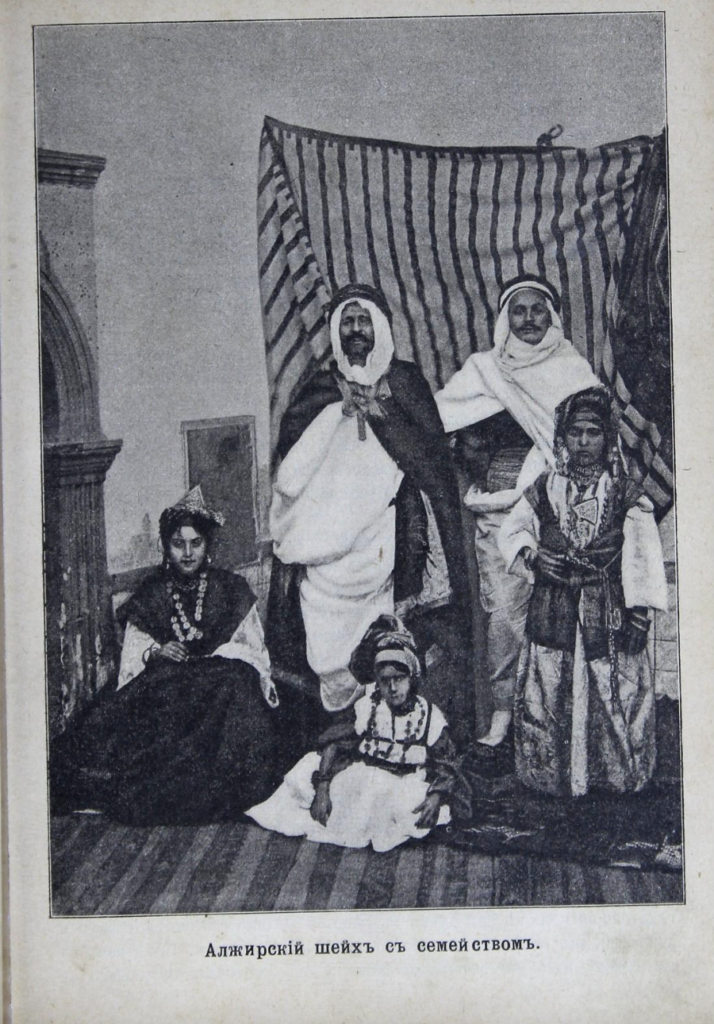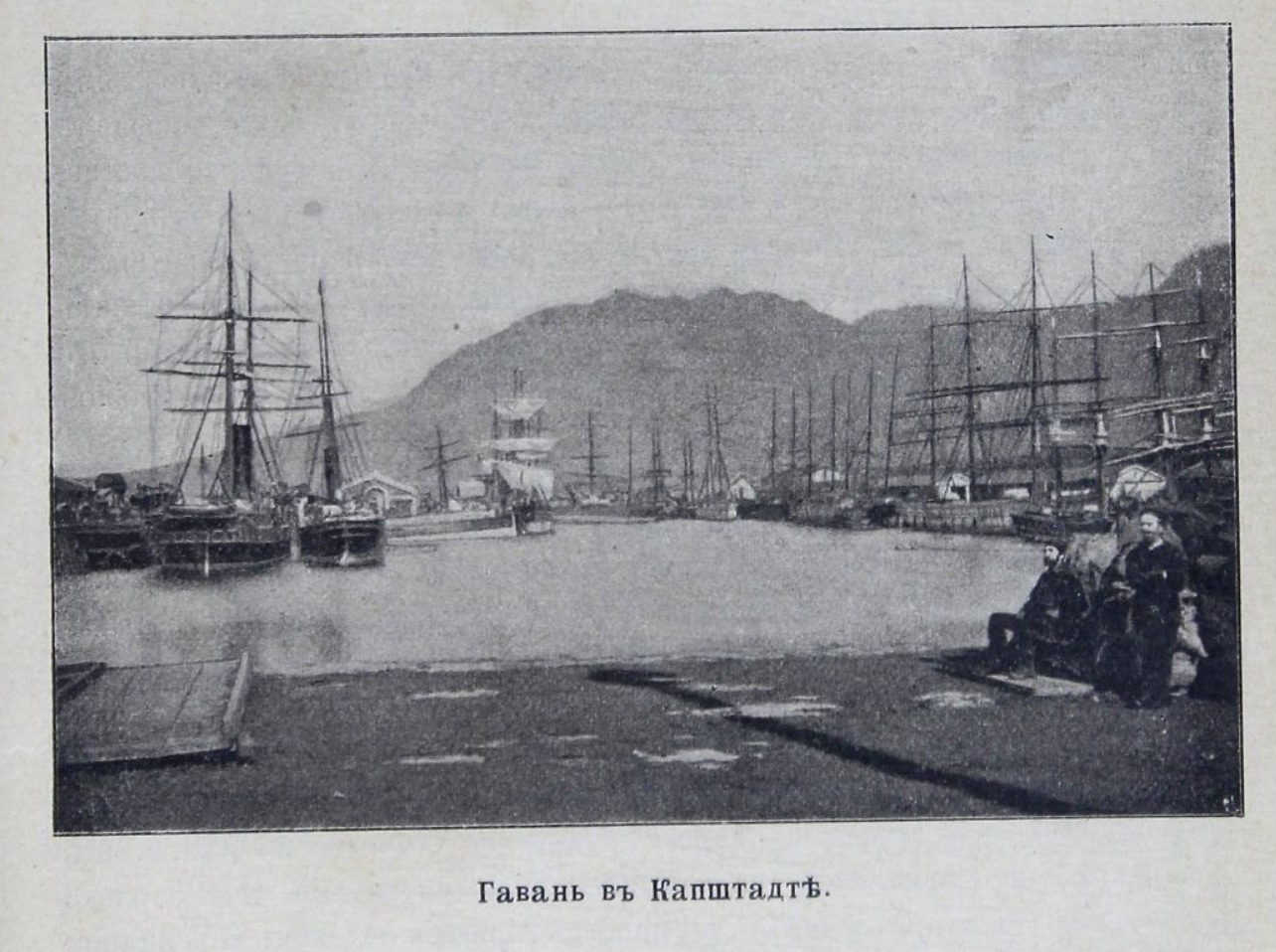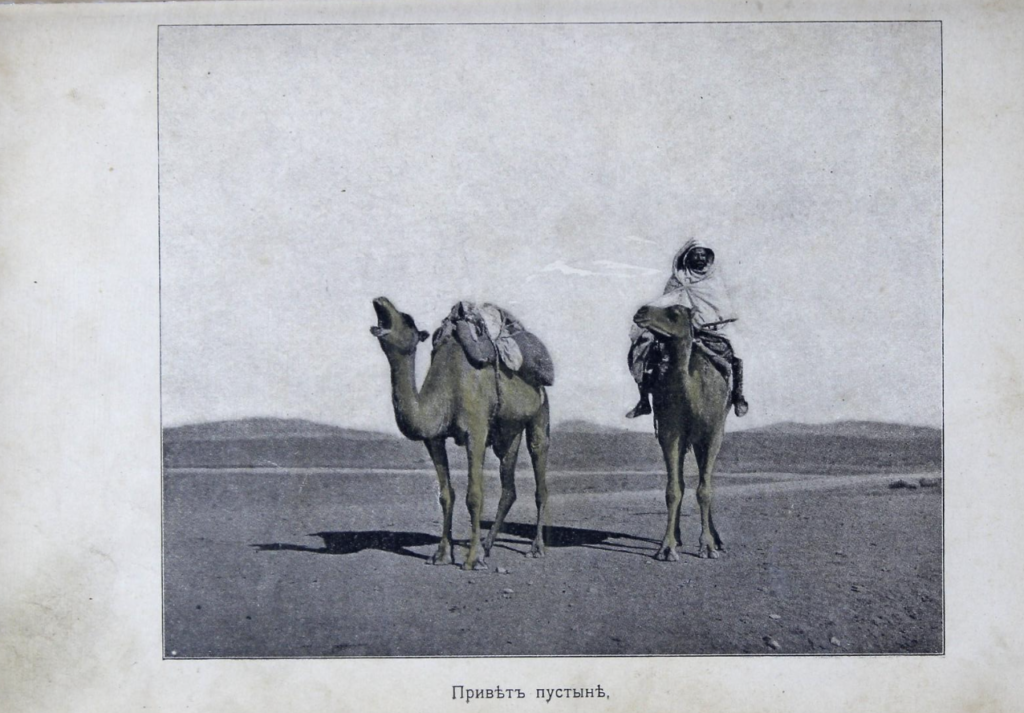Author
Kruber, Aleksandr Aleksandrovich (1871-1941)
Grigor’ev, Sergei Grigor’evich (1874-1931)
Barkov, Aleksandr Sergeevich (1873-1953)
Chefranov, Sergei Vasil’evich (1872-1952)
Title
Afrika. Illiustrirovannyi geograficheskii sbornik, Moskva 1902
Africa. An Illustrated Geographical Compendium
Summary
The book is divided into seventy-three chapters authored by experts and travellers such as Aleksandr Bulatovich, Aleksandr Eliseev, Evgenii Kartavtsev, Vasilii Junker, Vladimir Dedlov, Pavel Shchusev, among others. It includes a brief editor’s introduction and a list of illustrations, which indicates the sources of the images. The book is part of a series of geographical compendiums, with other volumes covering Asia, Europe, Australia, and Asiatic and European Russia. In the introduction, the editors state that their goals in publishing the volume on Africa were consistent with those of the previously published geographical compilations in the series. However, they had to rely more heavily on foreign sources to provide the most comprehensive picture of Africa possible. The chapters of the volume offer a detailed description of Africa, beginning with Tenerife and moving on to Morocco, Tunisia, Algeria, Tripoli, the Sahara, the main cities of Egypt, Nubia, Ethiopia, Sudan, Liberia, Congo, the forests and villages of Central Africa, Kilimanjaro, Cameroon, Angola, Ngami, South Africa, and, finally, Madagascar. These chapters are enriched with numerous illustrations, depicting local people, the diverse nature of Africa, cityscapes, landscapes, and architecture.
Bio
Aleksandr Kruber was a geographer and professor, regarded as the founder of Russian and Soviet karstology. Born in 1871 into a noble family, Kruber graduated from the Natural Sciences Department of the Faculty of Physics and Mathematics at Moscow University in 1896. In 1905, he passed his master’s examinations and delivered lectures, earning the qualification to teach courses. In 1915 he defended his dissertation, “Karst Area of the Mountain Crimea”. For this work, he was awarded the P. P. Semyonov-Tyan-Shansky Silver Medal by the Geographical Society. In protest against the reactionary regime of Education Minister Lev Kasso, Kruber left Moscow University in 1911, returning only in 1918. During his absence, he taught at the Higher Women’s Courses in Moscow (1911-1917), where he established the Department of Geography. In 1919, Kruber took his teacher D. Achunin’s chair of geography at Moscow University and later worked as the director of the Research Institute of Geography from 1923 to 1927. He also managed the university’s geographical museum, founded by Anuchin. From 1917 onward, Kruber edited the journal “Zemlevedenie”. His research was primarily focused on the study of karst formations in the East European Plain, Crimea, and the Caucasus. In 1927, severe illness forced him to retire from academic work.
Sergei Grigor’ev was a geographer, traveller, historian, educator, and professor at Moscow University. In 1892, he enrolled in the Natural Sciences Department of Imperial Moscow University. After completing his studies, he began a career in teaching. He taught at S. A. Arsenyeva’s Women’s Gymnasium and at the Moscow School of the Order of St. Catherine. Together with A. Barkov, A. Kruber, and S. Chefranov, he played a key role in transforming geography teaching in Russia. Between 1900 and 1904, he collaborated with them to create a series of geography textbooks, manuals, and methodological guides. He travelled extensively throughout the central and southern regions of Russia, Scandinavia, Western Europe, Turkey, Egypt, and Syria. He climbed Vesuvius and Etna, studied the karst landscapes of Crimea and Western Europe, explored the lakes of Northern Spain, and examined the glaciers of the Alps. In the spring of 1917, he returned to Moscow University as an associate professor. During the Soviet period, he actively participated in the work of the Committee of the North under the All-Russian Central Executive Committee, the Committee for Nature Protection, and the Geographical Society.
Aleksandr Barkov was a geographer, professor, and doctor of geographical sciences, as well as a member of the Academy of Pedagogical Sciences of the RSFSR. From 1894 to 1898, he studied at the Department of Natural Sciences at the Faculty of Physics and Mathematics at Moscow University, where he graduated with a gold medal under the mentorship of Professor D. Anuchin. Barkov began his teaching career in 1899, and between 1900 and 1904, he collaborated to publish a series of illustrated geography textbooks. In 1911, Barkov was appointed director of A. E. Fleurov’s Men’s Gymnasium, a position he held until 1925. Beginning in 1920, he also led the School Sub-department of the Moscow Department of Public Education. In 1935, Barkov was awarded the degree of Doctor of Geographical Sciences, and in 1944, he was elected a full member of the Academy of Pedagogical Sciences of the RSFSR. In July 1945, Barkov was honoured with the title of Honoured Scientist of the RSFSR and was awarded both the Order of Lenin and the Order of the Red Banner of Labor.
Sergei Chefranov was a geographer, educator, and author of geography textbooks. He graduated from the Physics and Mathematics Faculty of Moscow University in 1896 and began his teaching career as a geography teacher in 1900. Between 1900 and 1904, he collaborated with A. Kruber, S. Grigoriev, and A. Barkov to create four geography textbooks for secondary schools and seven illustrated geographical collections for teachers, all of which were repeatedly reprinted. Chefranov continued his work in geography education after the 1917 revolution, teaching at pedagogical universities in Moscow, Voronezh University, and Yaroslavl’ Pedagogical Institute (1946-1948). At the Institute of Teaching Methods of the Academy of Pedagogical Sciences of the RSFSR, he conducted research on the methodology of teaching geography in schools and universities. He published numerous textbooks and manuals of physical geography for secondary schools and, in particular, authored 15 editions of the textbook Geography of the USSR for secondary schools.
Sources
N. Sokolov, Aleksandr Sergeevich Barkov, ego zhizn’ i deiatel’nost’, “Voprosy geografii”, 1957, 40, p. 32-40;
Kratkaia geograficheskaia entsiklopediia, ed. by A. Grigor’ev, t. 5, Moskva 1966, p. 535;
B. Ermolin, Sergei Grigor’evich Grigor’ev: 1874-1931, in Kalendar’ znamenatel’nykh dat, Arkhangel’sk 1994, p. 48-50;
V. Dublianskii, Aleksandr Kruber – otets russkogo karstovedeniia, “Peshchery”, 2001, 27-28, p. 204-208;
Pedagogicheskii entsiklopedicheski slovar’, ed. by B. Bim-Bad, Moskva 2003, p. 422;
J. Oldfield, D. Shaw, A Russian Geographical Tradition? The Contested Canon of Russian and Soviet Geography, 1884-1953, “Journal of Historical Geography”, 2015, 49, p. 75-84.
M.E.
Gallery
